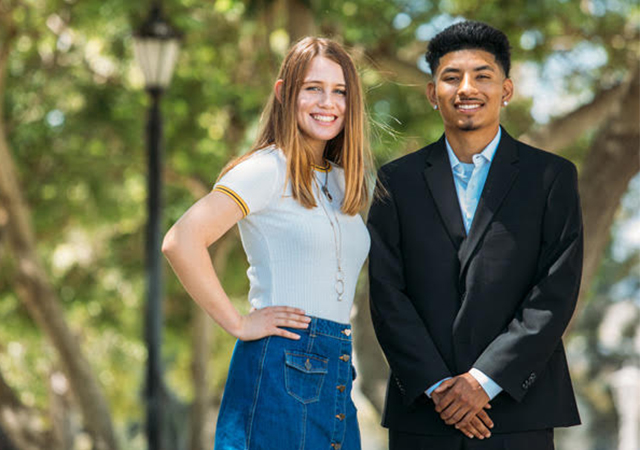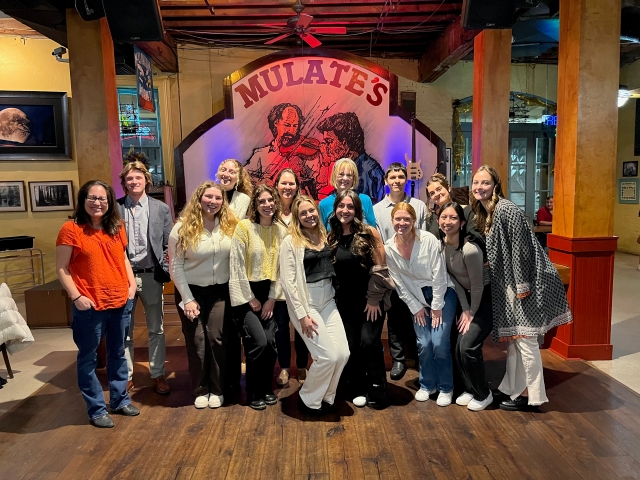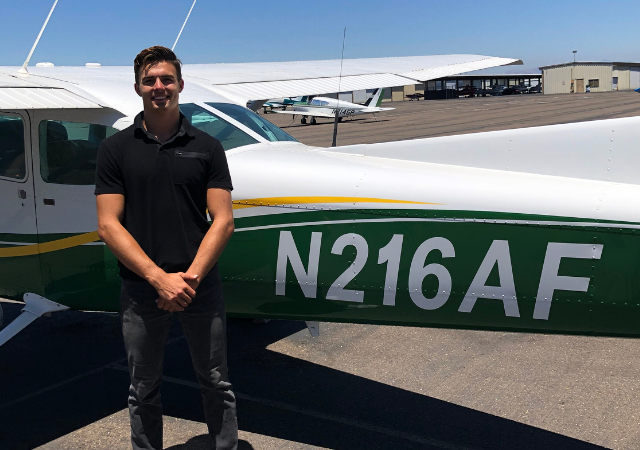Toreros Gain Awareness at Homelessness and Food Insecurity Week Events
The first Homelessness and Food Insecurity Week at the University of San Diego concluded Thursday night with tables full of students in a room at the Joan B. Kroc Institute for Peace and Justice giving organizers action-oriented ideas that the campus community should pursue.
All ideas written down on colorful Post-Its were stuck to a larger piece of paper and accompanied by a blue dot to represent a vote. Some ideas already have a home on the USD campus, like food waste programs, but others desire to extend what already exists on campus, such as a food pantry that extends into the Linda Vista neighborhood. Many students attending Thursday's event want to see leftover food at the end of each night be more available for those in need. Many, too, are in favor of their unused meal plan dining dollars being eligible to transfer to those who are hungry.
The compassionate, empathetic responses at this event and throughout the week resulted in organizers of the Urgent Challenges Collective, Political Science and International Relations Professor and Changemaker Hub Director Mike Williams, PhD, and Kate DeConinck, ThD, a teaching professor in Theology and Religious Studies, and campus partners terming this week as a success.
Bring awareness of both homelessness and food insecurity eye-level was the goal as each event from Oct. 21-24 had the intent of the campus community learning more about the multi-dimensional issues involved and thinking critically and creatively how to address them.
An interactive exhibit hosted throughout the week in the University Center Exhibit Hall across from the Torero Store was a chance for people to walk hand in hand with the issues.
On the first wall was a plethora of statistical data — written on cardboard signs — to remind how widespread the reach of homelessness and food insecurity is, locally, statewide and nationally. San Diego has the nation's fourth-largest homeless population. On any given night in 2018, more than 53,000 youth under age 25 were homeless. Just under 130,000 people experience homelessness on any given day in California. There was a tent set up as a visual reminder that for the individuals who are homeless in San Diego, 25 percent live in a hand-built structure or tent. Twenty-five percent live in a vehicle. Fifty percent have no shelter at all. There are large portrait drawings of homeless people's faces, men and women. There are books available for checkout at the Copley Library to learn stories of homelessness and food insecurity. There's also a station for visitors to write messages of hope for those who are facing homelessness.
Other events on campus were equally visible. Students made sandwiches as part of bag lunches that were then donated to Father Joe's Villages. An Oscar-winning film documentary, Inocente, was shown. It is the story of a 15-year-old girl in San Diego who, though homeless and undocumented, refuses to give up her dream of being an artist. A candlelight vigil was held for those experiencing homelessness and hunger and Wednesday evening's Mass for Peace had special intentions for those experiencing homelessness.
Thursday's main activity during Torero Hours was a Housing and Food Access Resource Fair at The Immaculata Lawn area. Father Joe's Villages and several local organizations who work with homeless populations and provide services to low-income, hungry populations sought to spread awareness and offer ways for students to volunteer and other ways to get involved. The Torero Program Board asked students to bring clothing donations. University Ministry offered opportunities for students to consider doing a San Diego Immersion trip Jan. 20-24, 2020, or to consider going on a group trip to downtown San Diego’s Rachel's Night Shelter, which serves homeless women with a meal prepared by volunteers, a table to sit with them, eat and have a conversation. The USD H.O.S.T. (Homeless Outreach Student Transition) organization, the USD Food Pantry and the San Diego Food Bank each provided information, too.
Thursday night's event was a chance to reflect on the week and to inspire the campus community to take what they've seen, done and learned, provide some feedback and seek ideas going forward, thus keeping this week in mind long after this week's events conclude.
Perhaps the best way to stay involved is to get involved. There are many resources and places on campus centering their attention to helping others. University Ministry, the Mulvaney Center for Community Awareness and Social Action, campus fraternity and sororities each have a dedicated charitable presence, and centers such as the United Front Multicultural Commons, the Women's Commons and the Black Student Resource Commons have spaces dedicated to events that bring us together to discuss and share experiences and build community.
Learn more about the Urgent Challenges Collaborative, the USD Food Pantry and Torero Closet and consider entering a two-minute video for the Changemaker Challenge — the idea theme is Homelessness, Displacement and Migration — by Nov. 14.
— Story, photos by Ryan T. Blystone
— Video by Allyson Meyer '16
Contact:
USD News Center
news@sandiego.edu
619-260-4600 x 6652




